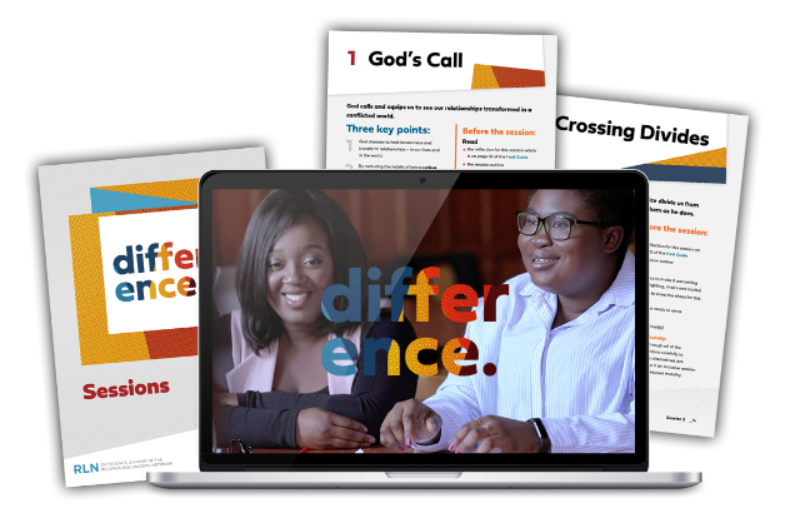The message of reconciliation in a polarised time
Rita Yoe introduces three habits from a free discipleship resource which helps communities pursue a more peaceful, reconciled world - modelled on the life of Jesus

Friends and colleagues often observe to me that our society feels increasingly polarised—that it’s increasingly difficult to make and keep relationships across differences of opinion and identity. I’d agree, and add that we are living in a time where all around, the stakes feel high.
From international and national news to our local communities, churches, and even family relationships, it feels like I’m constantly faced with news of current violence, impending disaster, betrayal and estrangement—and countless voices telling me how I should react, who I need to cut off, which issues deserve my attention, which people deserve my respect (or not).
Our online spaces and media reinforce and reward polarization, knowing that the “outrage cycle” will garner more clicks, streams, and revenue. A quick scroll through my own social media shows taglines that include '[Speaker] totally destroys [opponent]!' 'How to shut down [political party] in two sentences!'
When we think about disagreements and the very real and important identities and issues that divide us, our cultural narrative is being pulled more and more toward dominance and further from seeking growth, peace, and right relationship.
Behind every polarising issue, there is real pain and fear—real people, beloved by God. There are stories untold, voices unheard, needs unmet, which cause us to dig deeper into the safety of our echo chambers and make it more vulnerable, more risky to reach out across a divide.
And yet, Jesus calls us to a different way of living.
Throughout the gospels, we see Jesus engage and offer his good news to those who he would have been expected to avoid, even to fear, because of their background and beliefs: from Samaritan women to tax collectors to Roman officers. We follow a God who laid down his own defences and saw the humanity even in those who put him to death, praying 'Father, forgive them.'
2 Corinthians 5:17-20 reads:
'Therefore, if anyone is in Christ, the new creation has come: The old has gone, the new is here! All this is from God, who reconciled us to himself through Christ and gave us the ministry of reconciliation: that God was reconciling the world to himself in Christ, not counting people’s sins against them. And he has committed to us the message of reconciliation.' (NIV)
In these times as in Jesus’, taking up the call to love our neighbours and our enemies is difficult. We won’t arrive at perfection in this life, but Jesus calls us to follow him—starting right where we are.
In the Difference course, we identify three habits to grow and practise in pursuit of a more peaceful, reconciled world, modelled on the life of Jesus and the example of peacemakers throughout history.
-
Be Curious: Listen to others’ stories and see how the world looks through their eyes. We read in Genesis 1 that every person is made in God’s image. When we’re curious enough to seek out another’s story, we look for and honour God in them. By making curiosity a habit, we resist the temptation to make assumptions about those we disagree with, and instead practise asking what we could learn from or about them.
-
Be Present: Encounter others with authenticity and confidence. God’s response to our hurting and divided world was to become one of us, showing us what it means to be fully present. Our impulse when we encounter someone whose opinions or identity are opposite to ours can be to disengage—whether by withdrawing, keeping things surface level, or taking a proactively defensive posture. Practising presence as a reconciling habit means bringing our whole selves to our interactions, even the difficult ones.
-
Reimagine: Find hope and opportunity in the places where we long to see change. We live in the promise that God is making all things new (Revelation 21:5). Our world is shaped, and sometimes limited, by our imaginations. When divisions and conflict seem intractable and we face repeated disappointment, it can be hard to find hope or picture healed, thriving relationships. Reimagining is the choice to believe that new life is possible, even when that interrupts our expectations. It’s rarely a solo experience—we rely on community and the Holy Spirit to renew us and reveal new perspectives.
When you think about the conflicts and divisions in your own life and in the world, could practising these habits help make room for God’s healing work?
'Relevant and engaging for our young people'
The Difference course has been run by around 100 Baptist groups since 2022, including Ashley Baptist Church in New Milton, Hampshire.
Kate Perryman is the Youth, Children and Schools pastor there. She said, ‘The Difference course was both relevant and engaging for our young people, offering practical insight into the diverse world they live in. It was easily accessible and encouraged them to think deeply about how to navigate disagreements within their friendships, communities, and cultures while staying true to their own beliefs.
‘The course is particularly relevant for young people today, who often struggle to navigate disagreement well. Exploring how Jesus handled disagreement and extended forgiveness proved especially impactful, helping them see how faith can shape real-life relationships.
‘As a leader, I particularly appreciated how adaptable the course was for different ages and for young people at varying stages in their faith journey.’
Rita Yoe is Youth and Children’s Engagement Manager for the Difference course.
Difference is a free discipleship resource for communities to explore following Jesus in our messy, hurting, and divided world through Bible study and conversation in community. The course can be run by clergy or laypeople, with versions available for churches, youth groups, prison ministries, and schools.
Visit difference.rln.global or email hello@rln.global to learn more.
Baptist Times, 10/11/2025